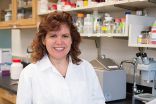(Press-News.org) Genomic data could predict whether statins will benefit a patient or not, according to an article in the open access journal Genome Biology. The research suggests that genomic data alone can explain around 15% of patients' responses to a cholesterol-lowering statin, and further studies could increase the accuracy of these predictions.
The study looked at data from 372 participants in an American clinical trial for the statin, Simvastatin, and found that certain genetic signatures were more common in patients whose cholesterol was effectively lowered by the treatment, while others were associated with patients who hadn't responded so well. It was possible to predict how 15% of the patients would respond to statins, and this data could help clinicians to make a decision about whether to prescribe statins for individual patients.
Statins are used to try to lower patients' levels of cholesterol, a type of fat which is carried in the blood and can block arteries. While they reduce rates of heart disease in many patients, clinicians have debated whether they should be prescribed widely, because they have significant side-effects which some argue outweigh the benefits. Being able to predict which patients will respond to the drugs will help clinicians better target their prescription of the drugs and improve treatment outcomes.
This study, by scientists from the Children's Hospital Oakland Research Institute, investigated whether there were any genetic signatures that were associated with whether a statin lowered patients' LDL-cholesterol levels. They used data from Caucasian, non-smoking participants in a clinical trial for the drug Simvastatin. Looking back at the anonymized data, they were able to see which patients responded well to the treatment and which didn't, and compare those reactions to the data about their genomic profiles and gene expression.
They found that differences in around 100 genes could explain 12-17% of the variation in how effectively the statin lowered patients' LDL-cholesterol. The genes were particularly accurate in predicting the patients that responded very well or very poorly to the treatment. Some of these genes were involved in cholesterol metabolism, but further studies are needed to find out about the function of the others.
Because the paper only uses data from Caucasians from a single clinical trial cohort, the authors say that further study is needed to find out whether these genes are a good indicator in other populations.
INFORMATION:
Media Contacts
Anna Perman
Media Officer
BioMed Central
T: +44 (0)20 3192 2429
E: anna.perman@biomedcentral.com
Notes to Editor
1. Research
Prediction of LDL cholesterol response to statin using transcriptomic and genetic variation
Kyungpil Kim Eugene Bolotin Elizabeth Theusch Haiyan Huang Marisa W Medina and Ronald M Krauss
Genome Biology 2014 15: 460
Please contact Anna Perman for a copy of the article.
After embargo, article available at journal website here:
http://genomebiology.com/2014/15/9/460
Please name the journal in any story you write. If you are writing for the web, please link to the article. All articles are available free of charge, according to BioMed Central's open access policy.
2. Genome Biology serves the biological research community as an international forum for the dissemination, discussion and critical review of information about all areas of biology informed by genomic research. Key objectives are to provide a guide to the rapidly developing resources and technology in genomics and its impact on biological research, to publish large datasets and extensive results that are not readily accommodated in traditional journals, and to help establish new standards and nomenclature for post-genomic biology.
3. BioMed Central is an STM (Science, Technology and Medicine) publisher which has pioneered the open access publishing model. All peer-reviewed research articles published by BioMed Central are made immediately and freely accessible online, and are licensed to allow redistribution and reuse. BioMed Central is part of Springer Science+Business Media, a leading global publisher in the STM sector.
Genomic data could help doctors know whether to prescribe statins
2014-09-30
ELSE PRESS RELEASES FROM THIS DATE:
Half of global wildlife lost, says new WWF report
2014-09-30
Washington, DC – Monday, September 29: Between 1970 and 2010 populations of mammals, birds, reptiles, amphibians, and fish around the globe dropped 52 percent, says the 2014 Living Planet Report released today by World Wildlife Fund (WWF). This biodiversity loss occurs disproportionately in low-income countries—and correlates with the increasing resource use of high-income countries.
In addition to the precipitous decline in wildlife populations the report's data point to other warning signs about the overall health of the planet. The amount of carbon in our atmosphere ...
Association of physical activity with diabetes is weakest among women at high genetic risk
2014-09-30
New research published in Diabetologia (the journal of the European Association for the Study of Diabetes) suggests that the protective effect of physical activity against diabetes is weakest among those at high genetic risk. The research is by Dr Yann Klimentidis, an Assistant Professor at the University of Arizona Mel and Enid Zuckerman College of Public Health, in Tucson, AZ, USA, and colleagues.
It is well established that physical activity reduces type 2 diabetes risk. However, the extent of protection afforded by physical activity may differ according to genetic ...
Annals of Internal Medicine tip sheet for Sept. 30, 2014
2014-09-30
Prop 46 Physician Drug Testing Mandate May Harm Patients it Aims to Protect
A new California ballot initiative being touted as a patient safety measure may create more problems than it solves, according to two new commentaries being published in Annals of Internal Medicine. Proposition 46, the Medical Malpractice Lawsuits Cap and Drug Testing of Doctors Initiative, would mandate random drug and alcohol testing of physicians and quadruple the cap on medical malpractice awards to $1.1 million. The authors argue that physician drug and alcohol testing should be unrelated ...
Landmark Medicare law had little impact on reducing chemotherapy cost
2014-09-30
WASHINGTON — Legislation passed in 2003 to slow the spiraling costs of drugs paid for by the federal government to treat Medicare patients has had no meaningful impact on cancer chemotherapy drug costs, say a team of researchers in the Journal of Clinical Oncology published online today.
"We looked at use of outpatient chemotherapy to treat colorectal and lung cancers, and did not find a substantial change in how oncologists prescribe those drugs following the implementation of the recent Medicare law in 2005," says the study's senior author, Arnold L. Potosky, PhD, a ...
Plants prepackage beneficial microbes in their seeds
2014-09-30
WASHINGTON, DC – September 29, 2014 -- Plants have a symbiotic relationship with certain bacteria. These 'commensal' bacteria help the pants extract nutrients and defend against invaders – an important step in preventing pathogens from contaminating fruits and vegetables. Now, scientist have discovered that plants may package their commensal bacteria inside of seeds; thus ensuring that sprouting plants are colonized from the beginning. The researchers, from the University of Notre Dame, presented their findings today at the 5th ASM Conference on Beneficial Microbes.
Plants ...
Sweat-eating bacteria may improve skin health
2014-09-30
Bacteria that metabolize ammonia, a major component of sweat, may improve skin health and some day could be used for the treatment of skin disorders, such as acne or chronic wounds. In a study conducted by AOBiome LLC, human volunteers using the bacteria reported better skin condition and appearance compared with a placebo control group. The researchers presented the study results at the 5th ASM Conference on Beneficial Microbes in Washington, DC.
Ammonia-oxidizing bacteria (AOB) are ubiquitous in soil and water and are essential components of the nitrogen cycle and ...
An apple a day could keep obesity away
2014-09-30
PULLMAN, Wash. – Scientists at Washington State University have concluded that nondigestible compounds in apples – specifically, Granny Smith apples – may help prevent disorders associated with obesity. The study, thought to be the first to assess these compounds in apple cultivars grown in the Pacific Northwest, appears in October's print edition of the journal Food Chemistry.
"We know that, in general, apples are a good source of these nondigestible compounds but there are differences in varieties," said food scientist Giuliana Noratto, the study's lead researcher. "Results ...
A 'frenemy' in Parkinson's disease takes to crowdsourcing
2014-09-30
The protein alpha-synuclein is a well-known player in Parkinson's disease and other related neurological conditions, such as dementia with Lewy bodies. Its normal functions, however, have long remained unknown. An enticing mystery, say researchers, who contend that understanding the normal is critical in resolving the abnormal.
Alpha-synuclein typically resides at presynaptic terminals – the communication hubs of neurons where neurotransmitters are released to other neurons. In previous studies, Subhojit Roy, MD, PhD, and colleagues at the University of California, San ...
Radiation risks should be considered and discussed before heart imaging
2014-09-29
Before undergoing heart imaging procedures involving radiation, healthcare providers should help patients understand why the procedure is needed and its potential benefits and risks, including risks related to radiation exposure, according to a new scientific statement in the American Heart Association's journal Circulation.
"With technological improvements, medical imaging has become an increasingly vital tool in diagnosing and treating patients with heart disease, but the rising use of the tests has led to increasing radiation exposure over the past two decades," said ...
Study finds information lacking from FDA on implanted medical devices
2014-09-29
Information is lacking on most implanted medical devices cleared by the U.S. Food and Drug Administration despite a legal requirement that companies submit scientific evidence about the devices' substantial equivalence to other devices already on the market.
Under what is known as the 510(k) review, the FDA clears about 400 implanted medical devices without clinical testing each year for market that are considered moderate to high risk. The FDA has a process that requires the applicant to provide scientific evidence that the new device is "substantially equivalent" ...

